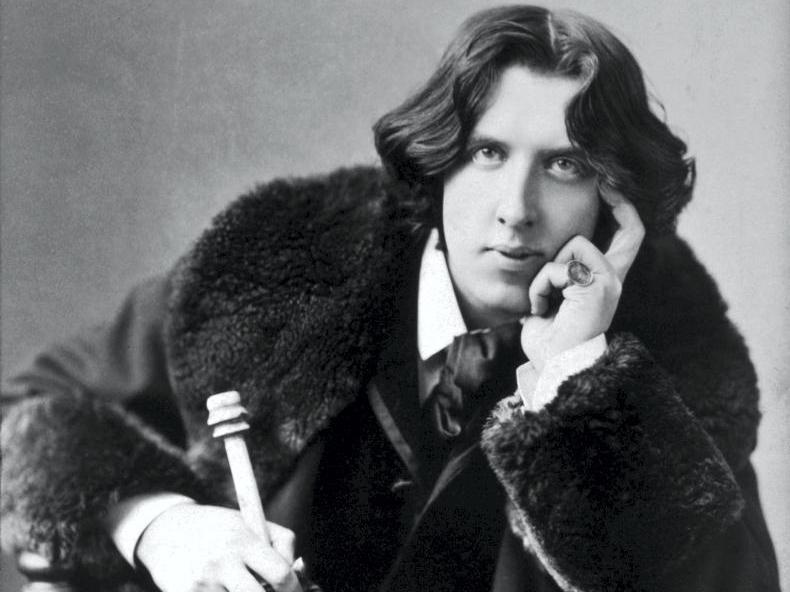Not alone was Oscar Wilde one of Ireland’s foremost playwrights, he was also a world-renowned genius.
Born in 1854 to an artistic family, Wilde endeared himself to his peers through his exceptional wit and intelligence, but his personal life for the most part, was unhappy.
His liaison with Lord Alfred resulted in a three-year jail sentence, including hard labour, for Wilde. This captive experience was the catalyst which produced his famous Ballad of Reading Jail.
In 1897, Wilde emerged from prison a broken man. Three years after release, he died a pauper in Paris and is interred in the Pere Lachaise Cemetery.
His sufferings also connected him, through a tragic family event, to a quiet corner of Co Monaghan.
A silent procession walked behind the horse-drawn hearse all dressed in black. Having travelled less than a mile, the small group of mourners reached their destination and halted outside the graveyard.
One distinguished-looking man stood aside in silent grief as the remains were carried
Four robust men stepped forward, lifted the coffin and shouldered it through the gateway to a freshly dug grave. One distinguished-looking man stood aside in silent grief as the remains were carried. After his daughter Mary was lowered into the stoney grey soil, Dr Wilde drifted slowly away from the cemetery.
Three weeks later an exact and poignant sequence was repeated as a similar cortege made its way from The Manor – the short distance to St Moha’s Church of Ireland Cemetery at Drumsnatt, Threemilehouse. Once again, Dr Wilde – an eminent eye and ear surgeon from Dublin – stood silent as his second daughter was interred beside her sister.
Both girls, Mary, 22, and Emily, 24, had come as guests to visit their relative, Rev Ralph Wilde, intending to explore and enjoy nearby Monaghan town.
The evening was successful and lived beyond expectations. Many of the guests had departed in their carriages
On the night of 31 October 1871 the local gentry decided to hold one of their regular balls and probably because of the presence of the two vivacious sisters, nearby Drummaconnor House was chosen as the venue.
This period two-storey dwelling, with its imposing steps leading to the front door, was the ideal setting. The evening was successful and lived beyond expectations.
Many of the guests had departed in their carriages when young Mary was persuaded by her host to rise for a last dance. She whirled gaily around in her flowing pleated dress, but as she glided past the open fire, oblivious to her surroundings, her clothing came in contact with the blazing embers and within seconds she was engulfed in a mass of fire.
Her sister Emily watching on, aware of the imminent danger, came to Mary’s aid but was unable to quell the flames.
Meanwhile Emily, in attempting to save Mary, also became smothered in flames and suffered severe burns
Mary was bundled downstairs to the cold outdoors but despite being rolled on the wet grass the fireball that encased her continued to burn to such an extent that she died within three days, on 3 November 1871.
Meanwhile Emily, in attempting to save Mary, also became smothered in flames and suffered severe burns.
She lingered in great pain, and despite the best medical attention available she survived only a further three weeks and was buried alongside her sister in the Church of Ireland Graveyard.

They were lovely and pleasant in their lives and in their death they were not divided.
On my visit to Drumsnatt cemetery near the village of Threemilehouse, Co Monaghan, I observed a granite headstone which commemorates Oscar Wilde’s sisters, on which the faded inscription reads – “In memory of two loving and beloved sisters, Emily Wilde aged 24 yrs and Mary Wilde aged 22 yrs, who lost their lives by accident in this Parish in November 1871.”
Taken from Fireside Miscellany by Denis O’Higgins. This book, about growing up on a small farm in Roscommon, came about when Denis started to relay these bedtime stories of those Horse and Cart days, to his own daughter in her childhood.
Read more
Musings by Cormac Troy: family heirlooms – both priceless and worthless
The many tales of: teachers from Killashee old school
Not alone was Oscar Wilde one of Ireland’s foremost playwrights, he was also a world-renowned genius.
Born in 1854 to an artistic family, Wilde endeared himself to his peers through his exceptional wit and intelligence, but his personal life for the most part, was unhappy.
His liaison with Lord Alfred resulted in a three-year jail sentence, including hard labour, for Wilde. This captive experience was the catalyst which produced his famous Ballad of Reading Jail.
In 1897, Wilde emerged from prison a broken man. Three years after release, he died a pauper in Paris and is interred in the Pere Lachaise Cemetery.
His sufferings also connected him, through a tragic family event, to a quiet corner of Co Monaghan.
A silent procession walked behind the horse-drawn hearse all dressed in black. Having travelled less than a mile, the small group of mourners reached their destination and halted outside the graveyard.
One distinguished-looking man stood aside in silent grief as the remains were carried
Four robust men stepped forward, lifted the coffin and shouldered it through the gateway to a freshly dug grave. One distinguished-looking man stood aside in silent grief as the remains were carried. After his daughter Mary was lowered into the stoney grey soil, Dr Wilde drifted slowly away from the cemetery.
Three weeks later an exact and poignant sequence was repeated as a similar cortege made its way from The Manor – the short distance to St Moha’s Church of Ireland Cemetery at Drumsnatt, Threemilehouse. Once again, Dr Wilde – an eminent eye and ear surgeon from Dublin – stood silent as his second daughter was interred beside her sister.
Both girls, Mary, 22, and Emily, 24, had come as guests to visit their relative, Rev Ralph Wilde, intending to explore and enjoy nearby Monaghan town.
The evening was successful and lived beyond expectations. Many of the guests had departed in their carriages
On the night of 31 October 1871 the local gentry decided to hold one of their regular balls and probably because of the presence of the two vivacious sisters, nearby Drummaconnor House was chosen as the venue.
This period two-storey dwelling, with its imposing steps leading to the front door, was the ideal setting. The evening was successful and lived beyond expectations.
Many of the guests had departed in their carriages when young Mary was persuaded by her host to rise for a last dance. She whirled gaily around in her flowing pleated dress, but as she glided past the open fire, oblivious to her surroundings, her clothing came in contact with the blazing embers and within seconds she was engulfed in a mass of fire.
Her sister Emily watching on, aware of the imminent danger, came to Mary’s aid but was unable to quell the flames.
Meanwhile Emily, in attempting to save Mary, also became smothered in flames and suffered severe burns
Mary was bundled downstairs to the cold outdoors but despite being rolled on the wet grass the fireball that encased her continued to burn to such an extent that she died within three days, on 3 November 1871.
Meanwhile Emily, in attempting to save Mary, also became smothered in flames and suffered severe burns.
She lingered in great pain, and despite the best medical attention available she survived only a further three weeks and was buried alongside her sister in the Church of Ireland Graveyard.

They were lovely and pleasant in their lives and in their death they were not divided.
On my visit to Drumsnatt cemetery near the village of Threemilehouse, Co Monaghan, I observed a granite headstone which commemorates Oscar Wilde’s sisters, on which the faded inscription reads – “In memory of two loving and beloved sisters, Emily Wilde aged 24 yrs and Mary Wilde aged 22 yrs, who lost their lives by accident in this Parish in November 1871.”
Taken from Fireside Miscellany by Denis O’Higgins. This book, about growing up on a small farm in Roscommon, came about when Denis started to relay these bedtime stories of those Horse and Cart days, to his own daughter in her childhood.
Read more
Musings by Cormac Troy: family heirlooms – both priceless and worthless
The many tales of: teachers from Killashee old school







 This is a subscriber-only article
This is a subscriber-only article










SHARING OPTIONS: